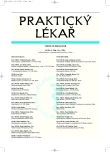-
Medical journals
- Career
Patent foramen ovale as a cause of paradoxical embolization in scuba divers. Screening possibilities, therapeutic and preventive recommendation.
Authors: T. Honěk 1; A. Tomek 2; M. Šrámek 2; J. Januška 3; L. Šefc 4; R. Kerekeš 5; Š. Novotný 6; J. Honěk 4; J. Veselka 1
Authors‘ workplace: Kardiovaskulární centrum FN Motol, Praha Přednosta: Doc. MUDr. Josef Veselka, CSc. 1; Neurologická Klinika FN Motol, Praha Přednosta: doc. MUDr. Martin Bojar, CSc. 2; Kardiocentrum Nemocnice Podlesí a. s., Třinec Vedoucí lékař: prim. MUDr. Marian Branný 3; Ústav patologické fyziologie 1. LF UK, Praha Přednosta: prof. MUDr. Emanuel Nečas, DrSc. 4; Interní oddělení SZZ Krnov Primář: MUDr. Naděžda Mičudová 5; Hyperbarická komora a poradna pro potápěče, Kladno Vedoucí: MUDr. Štěpán Novotný 6
Published in: Prakt. Lék. 2007; 87(1): 48-51
Category: Diagnostis
Overview
Introduction:
The formation of nitrogen bubbles in venous blood is common in a surfacing scuba-diver. Bubbles can pass through a patent foramen ovale (PFO) and can be a source for paradoxical embolization, resulting in the neurological form of decompression sickness (DCS).Methods:
We examined 32 scuba divers who had performed more than 100 dives. Right to left shunt detection suggesting the presence of PFO was detected by bubble contrast examination in all divers by means of transthoracic echocardiography (TTE) and transcranial Doppler sonography (TCD). The diagnosis of PFO was then made by means of transoesophageal echocardiography (TEE).Results:
Eleven patients had symptoms typical for the neurological form of DCS associated with an ascent. In this group, 91% (10/11) had PFO. In contrast only 10% of asymptomatic controls (2/21) had a PFO. TCD confirmed right to left shunting in all patients with PFO.Conclusion:
The neurological form of DCS can unmask as yet asymptomatic intracardiac right to left shunting. PFO represents a risk factor for the neurological form of DCS in divers. TCD enables easy screening and TEE is a gold standard for PFO diagnostics. Our results demonstrated that PFO detection is a useful clinical tool after repeat neurological DCS and should also be used for all frequent divers and instructors.Key words:
patent foramen ovale, scuba diving, decompression sickness
Labels
General practitioner for children and adolescents General practitioner for adults
Article was published inGeneral Practitioner

2007 Issue 1-
All articles in this issue
- Patent foramen ovale as a cause of paradoxical embolization in scuba divers. Screening possibilities, therapeutic and preventive recommendation.
- Hypoglycaemia-associated autonomic failure, its clinical assessment and treatment.
- Chronic renal failure in primary care
- Prescription of psychotropic drugs during pregnancy and breast-feeding in the general practitioner’s surgery.
- Wilson’s disease
- Diagnostics and treatment of rheumatoid arthritis – some new aspects
- Biochemical molecular mechanisms of heart failure (Part 2)
- Antimicrobial resistance in seven invasive bacterial species* monitored within EARSS in the Czech Republic (CR) from 2000 – 2006. (*Streptococcus pneumoniae, Staphylococcus aureus, Enterococcus faecalis, Enterococcus faecium, Escherichia coli, Klebsiella pneumoniae, Pseudomonas aeruginosa).
- Childhood injuries and their prevention
- Our experience with the treatment of acute mesenterial ischemia
- Craniopharyngioma in 79 years old man – a case study
- General Practitioner
- Journal archive
- Current issue
- Online only
- About the journal
Most read in this issue- Chronic renal failure in primary care
- Craniopharyngioma in 79 years old man – a case study
- Wilson’s disease
- Hypoglycaemia-associated autonomic failure, its clinical assessment and treatment.
Login#ADS_BOTTOM_SCRIPTS#Forgotten passwordEnter the email address that you registered with. We will send you instructions on how to set a new password.
- Career

